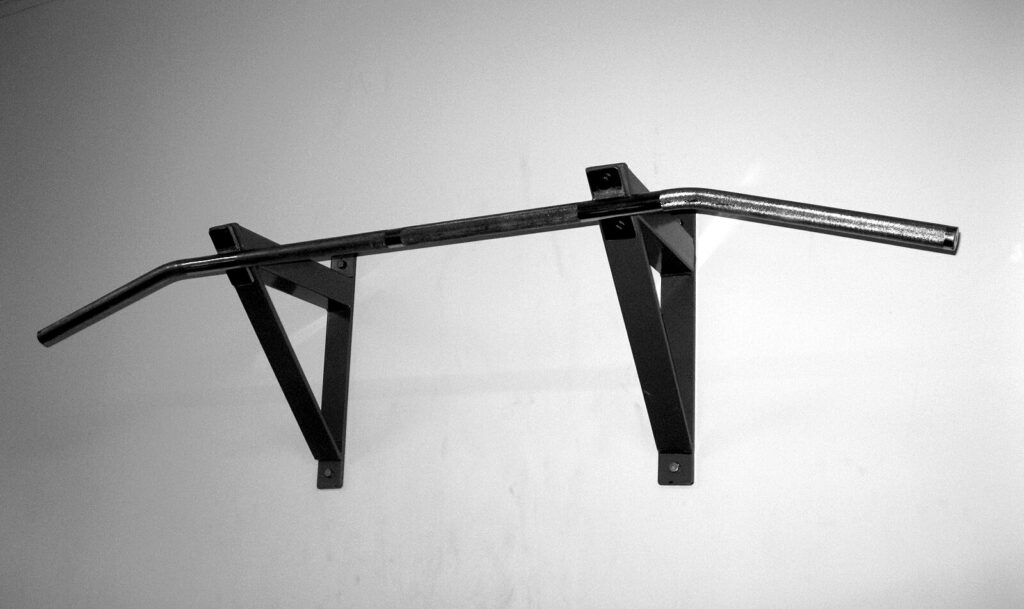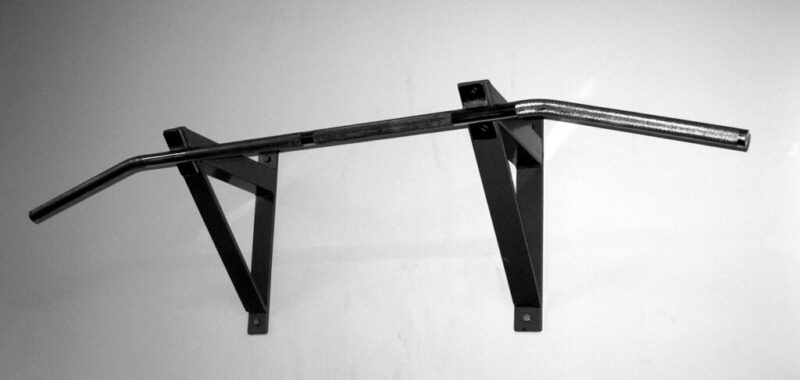
Photograph by Santeri Viinamäki, via Wikimedia Commons. Licensed under CC BY 4.0.
It’s the tail end of January, the month of resolutions made and broken, gym memberships purchased and fitness classes left unattended. This week, we’re publishing a series of dispatches from the gym.
My father wanted to be a gym teacher before his life drove him down another path. The ghost of his ambition has played a part in how much the gym and my gym teachers have meant to me.
Two examples:
One. Have you read J. G. Ballard’s 1968 short story “Why I Want to Fuck Ronald Reagan”? When Ronald Reagan, whom I would actually prefer not to fuck, revived the Presidential Physical Fitness Test, the chin-up requirement was an intimidating challenge for the kids at my elementary school.
But my father had been the pull-up champion of his Air Force unit and I’d always had a bar and brackets in my bedroom doorway, not for exercise but as something to play on and have fun with. Fat Geoff and Tall Jeff and Eric and Dena and Tony and Jenny and Jamie and Matt and Amy and Ryan and Janelle (who was as tall as a giraffe, hence her nickname “Girelle”) and Little Brad and Sara and Big Peaky and Little Peaky and Chad and Brooke would come over, and when we weren’t playing Atari we would do skin-the-cats or Tarzan swings on a sturdy yellow tie strap my father had brought home from the dealership. I was not intimidated by the bar.
I was, however, hesitant to stand out, to excel, to draw attention to myself, to be the nail that sticks up and gets hammered down, and I started to sweat when it turned out almost no one in my gym class could do a chin-up. Freckle-faced little Potts managed one, shaking and straining, and he got a round of applause.
Now it was my turn. One, two, three, four, five. No applause.
“Show-off,” Potts snarled, and Coach Cunningham said, “Take off running, Potts. I’ll tell you when to quit. Go on, Daniels. Show them how it’s done.”
I had plenty more in me, but I was about to let go and drop off the bar. And then Coach Cunningham spoke quietly, close to my ear. He is still standing there, speaking to me. This is what he says: “Listen to me, Daniels. If you do less than your best to try to get these weasels to like you, I promise you this is the last day of your life. I will make you run until you die.”
My mother’s favorite D. H. Lawrence story was 1926’s “The Rocking-Horse Winner.” It’s about a boy who can see the future, if he rides his horse until he dies. The crucial scene:
“It’s Malabar!” he screamed in a powerful, strange voice. “It’s Malabar!”
His eyes blazed at her for one strange and senseless second, as he ceased urging his wooden horse. Then he fell with a crash to the ground, and she, all her tormented motherhood flooding upon her, rushed to gather him up. …
“What does he mean by Malabar?” she asked her brother Oscar.
“It’s one of the horses running for the Derby,” was the answer. …
“I never told you, mother, that if I can ride my horse, and get there, then I’m absolutely sure—oh, absolutely! Mother, did I ever tell you? I am lucky!”
“No, you never did,” said his mother.
But the boy died in the night.
And Aeschylus, in Seven against Thebes, has Eteocles tell the chorus: “The gods, I am sure, have already ceased to think of us. The offering they desire from us is that we die.”
It would not be accurate to say that I remember my gym teacher whispering to me. I am still there. I am still wearing my blue-and-gold gym uniform, blue of staunchest friendship’s color / with thy golden hue will glow / to lead us on to goals more high / and on us joy bestow. I am still hanging from that bar by the bleachers in the sudden sweat-stink of my fear of God the gym teacher, of God the Father. I am hanging from the past, staring at the burning future, riding my horse until I die. Don’t forgive them, Father, they know exactly what they are doing.
***
Two. Our gym teacher Coach Williams rushed through the door of Mr. Tatum’s science class and looked around and saw me and pointed and said, “Daniels, stand up and tell me who threw that book out the window,” and I had to say that I had done it.
He stared at me. I stared back at his bristly blond mustache. Then he said, “I knew you wouldn’t lie to me, Daniels. Get yourself out in this hall.”
“Daniels, you skillet-head,” he said. “I was having the boys do jumping jacks under the window. That book could have hurt somebody. What good could possibly come from throwing a book out a window? Why would you do something like that?”
I told the truth. “A girl dared me. I was trying to impress a girl.”
“What girl?”
“I don’t throw and tell, Coach.”
He smirked. “All right, you G.E. lightbulb-head, I hope you impressed her. Now I have to write you up.” He gave me detention.
But detention is not a punishment, it is a reward. Detention was my favorite part of school.
Please, Coach, don’t make me sit quietly in the cafeteria after school, so I’m not at home listening to my parents yell at each other, and all the bad girls are making eyes at me, and I don’t have to talk to anyone and no one is allowed to talk to me, and I can read anything I want for hours.
I loved getting detention. I wish I were in detention right now.
J.D. Daniels is the winner of a 2016 Whiting Award and The Paris Review’s 2013 Terry Southern Prize. His collection The Correspondence was published in 2017. His writing has appeared in The Paris Review, Esquire, n+1, and elsewhere, including The Best American Essays and The Best American Travel Writing.

